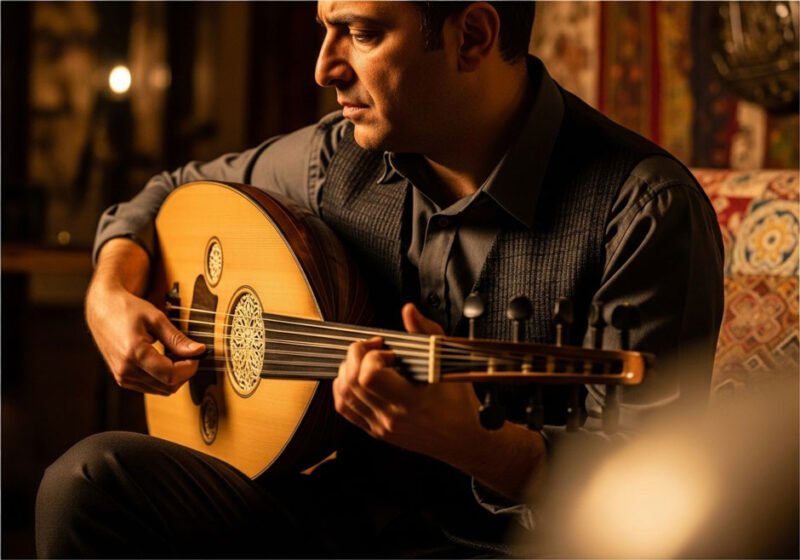Introduction: The Voice of the Oud
Born in New Jersey in 1958, Ara Dinkjian embarked on his musical journey at a remarkably young age. His Armenian heritage profoundly shaped his artistic path. As the son of Onnik Dinkjian, a celebrated singer of Armenian folk music and liturgical chants, Ara inherited a rich musical legacy. This early immersion in traditional Armenian melodies and rhythms laid a crucial foundation for his distinctive musical voice, seamlessly blending ancestral sounds with contemporary expressions.
Early Life and Armenian Roots
Dinkjian’s formal musical education began at the University of Hartford Hartt School, where he pursued a specialized degree in the oud. In 1980, he made history by becoming the first person in the United States to earn such a distinction, a significant step in recognizing the instrument within Western academia. His dedication to the oud, coupled with a deep understanding of its historical and cultural importance, positioned him as a pioneer, bringing this ancient instrument to a broader global audience.
The Genesis of Night Ark
The mid-1980s marked a pivotal moment in Ara Dinkjian’s career when he co-founded the instrumental quartet Night Ark. This ensemble, with its unique blend of traditional Middle Eastern and contemporary jazz influences, quickly garnered international acclaim. Night Ark’s innovative sound, characterized by Dinkjian’s evocative oud melodies, helped redefine the boundaries of world music.
Their albums, including ‘Picture’ and ‘Moments,’ released under RCA/Novus, showcased their distinctive musical fusion. Night Ark’s performances and recordings introduced the oud to new audiences, solidifying Dinkjian’s reputation as a visionary musician. The band’s success paved the way for greater appreciation of ethnic music on a global scale.
Compositions and Global Recognition
Beyond his work with Night Ark, Ara Dinkjian is a prolific composer. His works have been recorded in numerous languages and performed by renowned artists worldwide. His compositions often weave traditional Armenian melodies with contemporary arrangements, creating a sound that is both deeply personal and universally appealing. One of his most celebrated pieces, “Dinata,” achieved multi-platinum status and was famously performed during the closing ceremonies of the 2004 Olympic Games in Athens, introducing his music to a global audience of millions.
His collaborations with prominent singers such as Eleftheria Arvanitaki and Sezen Aksu further highlight his versatility and influence. Dinkjian’s ability to infuse his compositions with emotional depth and cultural richness has made him a sought-after collaborator and a respected figure in the international music scene. His music transcends linguistic barriers, speaking directly to the heart and soul of listeners across diverse cultures.
Collaborations and Solo Ventures
Ara Dinkjian’s musical journey extends far beyond his work with Night Ark, encompassing a rich tapestry of collaborations and solo ventures. He has shared stages and studios with a diverse array of musicians, exploring various genres and pushing the boundaries of his instrument. His solo oud recordings, such as ‘Conversations With Manol’ (2013), beautifully showcase his profound technical skill and emotive interpretation, offering listeners an intimate glimpse into his musical soul.
Furthermore, Dinkjian has been a part of significant projects like The Secret Trio, where he collaborates with kanunist Tamer Pınarbaşı and clarinetist Ismail Lumanovski. This trio explores chamber-music style arrangements of ethnic folk, pop, classical, and jazz, demonstrating Dinkjian’s adaptability and willingness to experiment. Their albums, ‘Soundscapes’ (2012) and ‘Three Of Us’ (2015), are testaments to their innovative approach to cross-cultural musical dialogue through music. His collaborations also include deeply personal projects, such as ‘Diyarbekiri Hokin’ (The Soul of Diyarbekir), a collaboration with his father Onnik, which pays homage to their ancestral roots and the rich musical heritage of Diyarbekir.
Legacy and Influence
Ara Dinkjian’s influence on music goes far beyond his individual performances and compositions. He has inspired a new generation of oud players and world music enthusiasts, showcasing the instrument’s versatility and its capacity for contemporary expression. His dedication to preserving and evolving Armenian musical traditions, while embracing global influences, has made him a cultural ambassador, fostering understanding and appreciation across diverse communities.
Through his extensive discography, numerous collaborations, and educational initiatives, Dinkjian has left an indelible mark on the landscape of world music. His ability to connect with audiences on a deeply emotional level, regardless of their cultural background, is a testament to the universal power of his music. He has shown that music can indeed be a bridge, connecting people and cultures through shared human experiences.
Conclusion: A Continuing Musical Journey
From his early days as a child prodigy accompanying his father to his current status as a globally recognized oud master, Ara Dinkjian’s musical journey is a testament to passion, dedication, and artistic innovation. He has not only mastered an ancient instrument but has also breathed new life into it, ensuring its continued relevance in the modern musical world. His compositions resonate with a timeless quality, blending the echoes of the past with the sounds of the present.
Ara Dinkjian continues to perform, compose, and inspire, leaving a rich legacy for future generations. His music serves as a powerful reminder of the beauty that emerges when cultural heritage is celebrated and shared, creating a harmonious dialogue that transcends borders and unites hearts. His ongoing contributions continue to enrich the global musical tapestry, solidifying his place as a true maestro of the oud.









